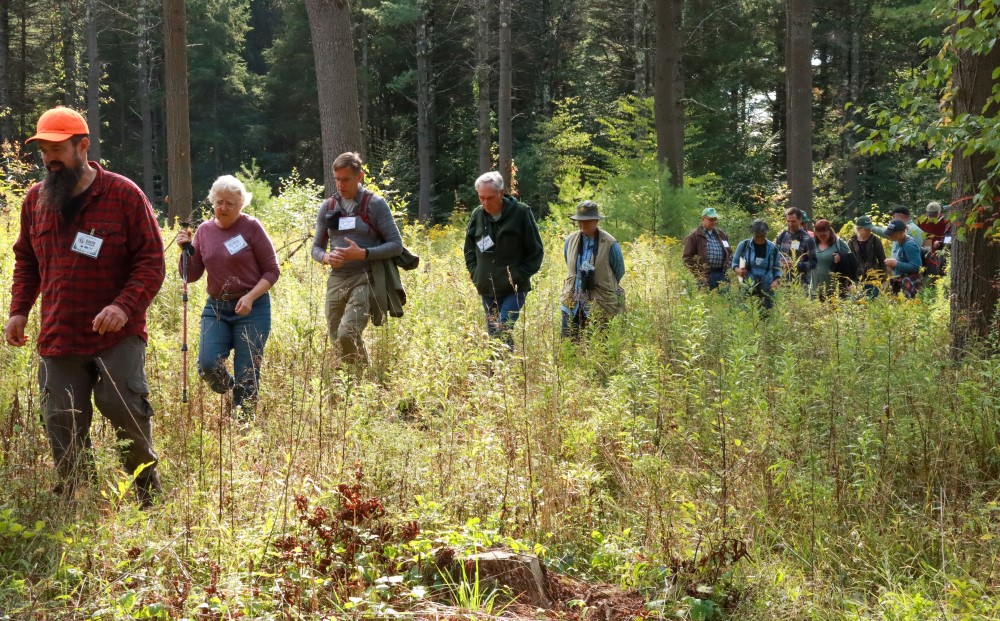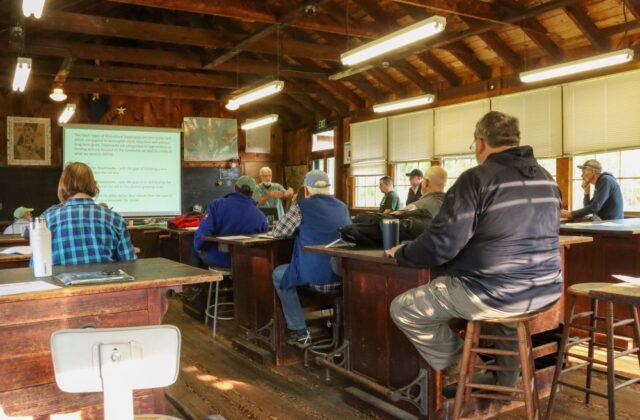Woodland Stewardship Training Helps Them See the Forest and the Trees
Program creates a state network of land stewards
Text By David Beers
Photos by William Carter

For many years, the third weekend of September at Great Mountain Forest (GMF) has been devoted to an intensive training for Connecticut woodland owners and land trust stewards. This year, 26 students from across the state were ensconced at Yale Camp at GMF for three full days of classroom and field instruction on forest and wildlife habitat management. A variety of professional instructors cycled through the camp, creating a unique mix of learning. The training is called ‘Coverts,’ after the Old English term for a thicket that provides shelter for wildlife. GMF is the covert for the students, who become ‘Covert Cooperators’ upon completing the training.
The Coverts program was developed in Vermont and Connecticut in 1983 and has spread to many other states. Coverts is run by a partnership of UConn Extension, the Connecticut Forest and Park Association (CFPA) and the Connecticut Department of Energy and Environmental Protection. All three organizations, along with Audubon Connecticut and GMF, provide the instruction. The goal of the weekend is to make wildlife healthier, more diverse and more abundant on the lands that the students care for.
GMF has hosted Coverts since its inception and provides bunkhouse lodging, meals, a ready forest classroom and evenings around the campfire. The rustic atmosphere, remote location and opportunity to play in the woods is reminiscent of summer camp. Forest landowners and those that are stewards of forest land, such as land trusts and town forests, attend.
The training is an even mix of classroom instruction and forest exercises. Students learn land-use history, tree and shrub identification, the different types of Connecticut forests and how/why trees grow where they do. They learn about different wildlife species, their needs, and how to provide for them. They are introduced to the many natural resource professionals and organizations available to help them. At the end of the weekend, their training is put to the test of examining real-life scenarios of land stewardship choices and public outreach challenges. Their responses to these case studies are remarkably creative.
Student Dan Carmody is a land steward for a large land trust in southwest Connecticut. He attended Coverts to see examples of hands-on forest management and to be exposed to a variety of professionals in the field. He said that he now has a much better sense of the many possible approaches to creating habitat for wildlife, commenting that “you see the forest through a different lens with a unique gathering of nature enthusiasts.” He plans to apply his new knowledge right away by writing a stewardship plan for a 40-acre land trust property that will include some small-scale habitat-creating projects.
Three days of training, meals, lodging and reference materials are provided for a fee of $200, augmented by grants and donations. Coverts graduates agree to develop a stewardship plan for the land they steward, to answer questions from other land stewards, and to make an active effort to reach out and motivate others in their community. Over the years, Covert graduates have helped thousands of land stewards make informed decisions about their land. Visit the CFPA website to learn more.

